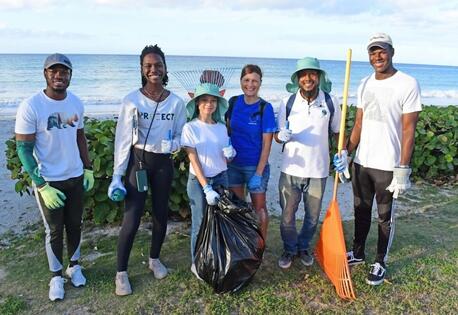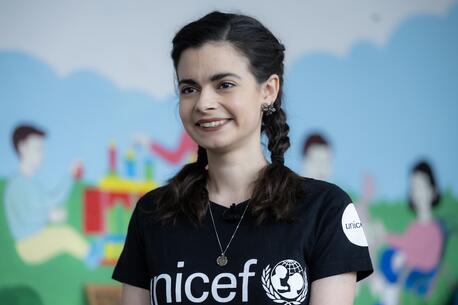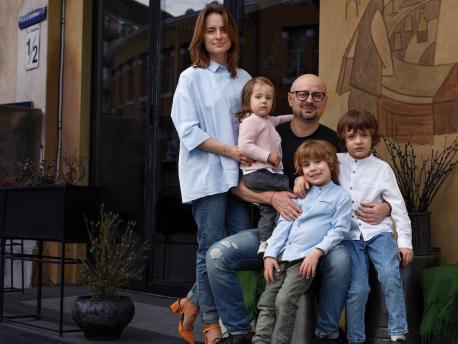
Coronavirus & Children: The Complete Guide
What to expect when parenting in the age of coronavirus. Here's how to stay informed, allay kids' fears and keep everyone working, learning, sane and safe.
UPDATED April 3, 2020
Schools across the country are closed and many businesses are operating remotely. If you’re a parent who is trying to work from home, you are probably feeling overwhelmed.
The logistics can be mind-boggling. Childcare may be more or less covered with everyone at home, but someone still has to supervise younger kids' learning. That's no easy feat while managing your own work and maintaining productivity.
Then there are the technical hurdles for educating your children through online learning. Do you have enough computers to accommodate everyone in your family who needs one? Some schools in California have partnered with PBS SoCal and KCET television stations to provide educational content to the students of the LA Unified school district, where 80 percent of children come from families living in poverty. But with many schools also conducting online learning with Google Classroom, Cisco's Webex and Zoom, divvying up computer time could be a challenge.
It’s a lot to juggle — especially while keeping your house clean and cupboards stocked — and the stakes are high. Passage of the Families First Coronavirus Response Act (FFCRA) is an important first step in providing some relief to children and families in the U.S. But families will need additional support as this crisis is not expected to end anytime soon. Here, to help you manage, are some facts, tips and answers to some of the biggest questions about the coronavirus that anxious parents and kids are asking.
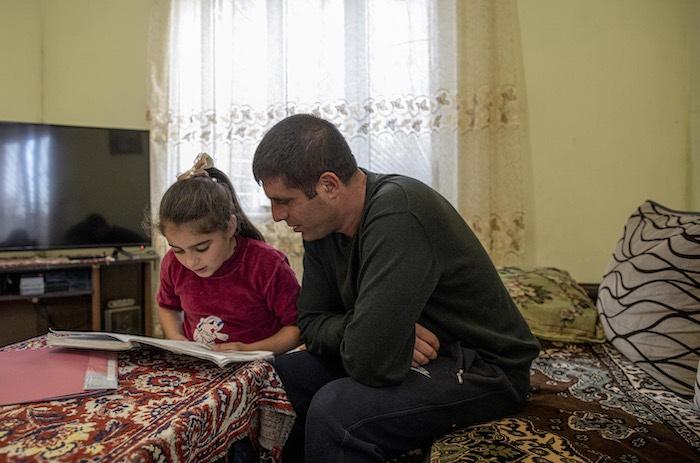
Homework has taken on new meaning since coronavirus has shut down schools around the world. Here, Hripsime, 9, (left) gets an assist with her studies from her father, Vladimir, at the family's home in Gyumri, Armenia. © UNICEF/UNI222104/Babajanyan VII Photo
Can kids get COVID-19?
COVID-19 is called the “novel coronavirus” for a reason. It is new and we have a lot to learn about it — including how it affects children and pregnant women. But according to the final report of a joint mission the World Health Organization and China formed to study the coronavirus in China, children under 18 made up only 2.4 percent of all reported cases, and most were mild. Just 2.5 percent of kids under the age of 19 developed a severe case; 0.2 percent were critical.
How are children affected by the coronavirus?
With cold and flu season ending and allergy season beginning, it wouldn't be unusual for your child to come down with a case of the sniffles. But now, coronavirus has many parents panicking at the first sign of a stuffy nose or sneezing.
The new study Epidemiology of COVID-19 Among Children in China confirms that coronavirus infections are less severe in children, while offering a clearer picture of how kids are affected by the virus. Of the more than 2,000 children with the virus who were followed, those with mild cases had symptoms that mimicked a cold: fever, fatigue, cough, runny nose and sneezing. Some kids, however, had no fever but experienced nausea, vomiting, abdominal pain and diarrhea.
Children with a moderate infection had pneumonia, frequent fever and a mostly dry cough, which was then followed by a productive, wetter cough and wheezing, but no obvious shortness of breath.
The study, like those published thus far, found the severe cases rare. Those began with fever and cough, accompanied by such gastrointestinal symptoms as diarrhea. About one week in, labored breathing began, with blood oxygen levels dipping below 92 percent. Children whose severe cases turned critical experienced acute respiratory distress, shock and potentially life-threatening vital organ failure.
How can we keep kids safe from the coronavirus?
Getting kids to slow down and wash their hands after playing outside or before meals can be tough. But now, it's more important than ever. Frequent handwashing offers essential protection from the coronavirus, if it's done correctly.
Younger kids won't know how, so make it easy and fun. Set up a stool in front of the sink and sing a song while you wash hands together: Using soap and water, lather up the entire hand, in between the fingers and up to the wrists, and wash for at least 20 seconds. Older kids may not need the same coaching, but they might not realize how long to scrub. After washing, dry hands thoroughly. Another "Do": cough or sneeze into a flexed elbow or tissue, then dispose of the tissue in a trash can with a lid, and wash hands again!
What’s on the "Don’t" list? Nose picking, face touching and getting too close to others. Requiring children to maintain their distance from one another can be a lot to ask, but if you take kids to the park or playground, it's crucial. Independent activities like riding bikes and scooters or playing a sibling soccer match are safe. For now, climbing on shared jungle gyms and play equipment is best avoided.
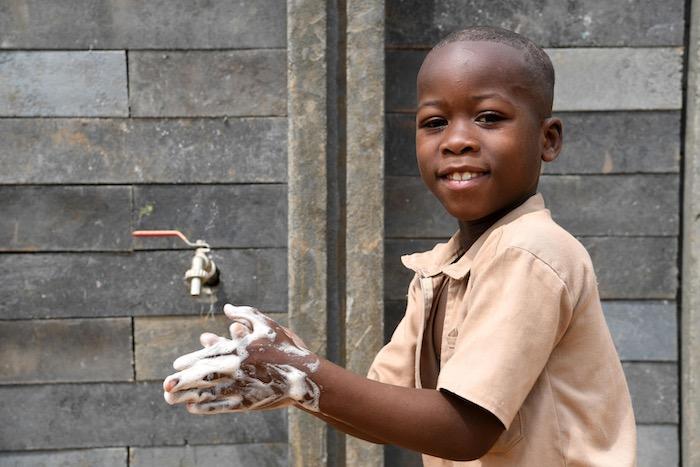
Frequent handwashing — with suds up to the wrists and between the fingers — is the key to coronavirus protection. This little boy from Côte d'Ivoire shows how it's done. © UNICEF/UNI280335/Dejongh
How many kids have been affected by the coronavirus?
Children account for the lowest percentage of infections so far. According to a study of 745 children in China who were believed to be highly susceptible to COVID-19, only 10 children — 1.3 percent — were infected with the virus. The report, published in mid-March, revealed that those who tested positive had mild symptoms. The final report from the joint WHO – China mission reported that no children in Wuhan, the city at the center of the pandemic, tested positive from November 2019 through the first two weeks of January 2020.
Though children have so far been largely spared, new information on how coronavirus manifests in kids is being released daily, so keep an eye on the news. Good sources to bookmark: the American Academy of Pediatrics and the COVID-19 information portal launched by UNICEF, which is working overtime to fight the spread of the disease caused by this new virus, debunk myths and dispense lifesaving information around the world.
Another way that the virus is affecting children is that it is interrupting or challenging their education. “Hundreds of millions of children are not in school," says UNICEF Executive Director Henrietta Fore. “These are uncharted waters for all of us."
Coronavirus and pregnancy: What to know
Research is underway, but according to the WHO, there is no evidence that pregnant women are at a higher risk for severe illness. However, due to changes in the body during pregnancy, respiratory infections can be more severe. So if you are having a baby, take all possible coronavirus-prevention precautions. If you develop a fever, cough or difficulty breathing, let your doctor know right away. Pregnant women who develop coronavirus symptoms are prioritized for testing. Those who test positive may require specialized care.
Is breastfeeding safe if you have coronavirus?
To date, the WHO reports, samples of neither amniotic fluid nor breastmilk have been found to contain the virus. That’s good news since breast milk gives babies all the nutrition — and vitamins, minerals, enzymes and antibodies — they need to grow up healthy and strong. Breastfeeding also helps babies’ brains develop, strengthens their immunity and even lowers the risk of obesity and other chronic diseases later in life. So mothers who have COVID-19 can breastfeed their babies but should make sure to:
Always wash hands before and after touching the baby
Wear a mask and practice respiratory hygiene when feeding the baby
Routinely clean and disinfect surfaces
Are babies and preschoolers particularly vulnerable to the coronavirus?
The new study of coronavirus infection in children released by the journal of the American Academy of Pediatrics reports that "while children are less likely to become severely ill than older adults, there are subpopulations of children with an increased risk for more significant illness."
Dr. Andrea Cruz, an associate professor of pediatrics of Baylor College of Medicine who co-authored a commentary on the study, concluded that more than 60 percent of the 125 children who became severely ill or critically ill were age 5 or younger. Forty of those were infants less than 12 months old. Cruz told the New York Times that preschoolers and babies are likely to get sicker because of their “immune system immaturity. They haven’t been exposed to viruses before, and therefore they can’t mount an effective immune response.”
Dr. Ronald Kleinman, Chief of the Department of Pediatrics at the Massachusetts General Hospital in Boston, reports that the hospital has suspended all non-urgent medical procedures except vaccinations for children up to age 2, because COVID-19 highlights the importance of keeping disease-stopping vaccinations up to date.
How to deal with school closures
Schools across the U.S. have been closed for weeks, and the list of those that won't reopen this academic year grows longer by the day. Parents and kids working and learning from home together pose myriad challenges. While some schools offer resources for online learning and remote classes, parents still find that they have had to take over for teachers and assume ultimate responsibility for their children's education.
Dr. Ronald Kleinman, Physician-in-Chief, Massachusetts General Hospital for Children and grandfather of four, offers this advice.
"Maintaining structure in a child’s day is important. Get them up and dressed and ready for a full day of activities — meals, schoolwork, exercise and physical activity, virtual playdates, snacks — at scheduled times. Sticking to a routine will support a child’s inherent resilience and help them transition from what they had before to what they will have again once this is over."
Though parents may feel overwhelmed, they may also discover that by instilling order in their kids' day, children can rise to the challenge and use this extraordinary time to learn new skills and grow in unexpected ways.
If your kids are afraid, let them do the talking
If you have much younger children who don’t know about COVID-19, there’s no need to break it to them. Emphasize the importance of good hygiene and make handwashing fun.
If your kids are older or aware of the crisis, then get them talking. Find out what they know and correct any anxiety-producing misconceptions they may be harboring. Resist the urge to minimize the situation. They’ll feel more secure if you hear them out and are open to answering all their questions.
If you are following online news together, bookmark such trusted sources as the websites of UNICEF, UNICEF USA and the World Health Organization. Using this as an opportunity to talk about the difference between real and fake news will help your children become more discerning consumers of information.
Each day comes with new revelations that we all find overwhelming. So, when talking with kids about the coronavirus, change the subject when they have had enough. Better yet, go have some fun. If you don't overload them, they'll be more likely to open up to you again.
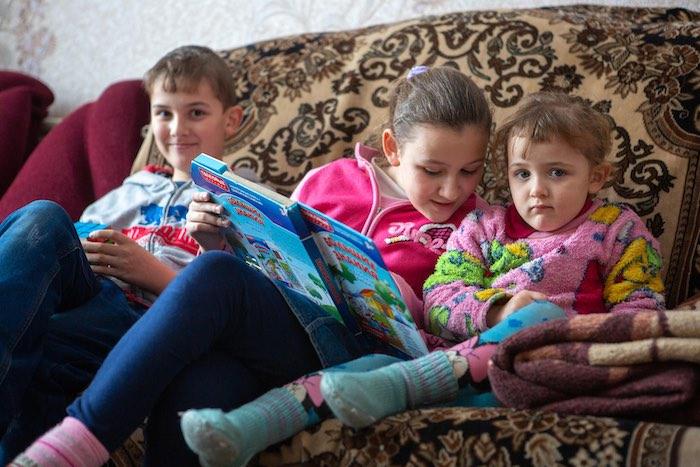
Children like (from left) Sergiy, 11, Tanya, 10, and Anna, 4, whose lives have been upended by the conflict in Ukraine, need extra reassurance during emergencies. Parents can relieve kids' anxiety about the coronavirus by listening to their children’s fears and teaching them how to keep themselves and others safe. © UNICEF/UN0300591/Filippov
Let children know we are all in this together
Children may have heard the coronavirus referred to as the "Chinese coronavirus." That is, of course, factually incorrect and racist. Kids need to know that the novel coronavirus, like a cold or flu, can infect anyone and that its existence is no one's fault. In response to the bias many Chinese and other Asian-Americans have experienced, the CDC issued this thoughtful guidance, which you could share with your children:
“Stigma is associated with a lack of knowledge about how COVID-19 spreads, a need to blame someone, fears about disease and death, and gossip that spreads rumors and myths. Stigma hurts everyone by creating more fear or anger towards ordinary people instead of the disease that is causing the problem.”
Stigma is associated with a lack of knowledge about how COVID-19 spreads, a need to blame someone, fears about disease and death, and gossip that spreads rumors and myths. Stigma hurts everyone by creating more fear or anger towards ordinary people instead of the disease that is causing the problem. — Centers for Disease Control and Prevention
When you talk to your kids, find out whether they or someone they know has been bullied or stigmatized. If so, reassure them that adults are there to help, and remind them that they can fight prejudice by spreading kindness and supporting one another.
Caring for yourself is key to caring for your kids
It’s a challenge to reassure your children when you feel unsettled or even frightened. With schools closed and so many parents working from home, the alone time everyone needs to recharge is harder to come by.
After the kids are in bed or before they wake up, take time for yourself and the things that soothe you: Read, talk to your partner, reach out to friends, exercise. The calmer you are, the safer your children will feel.
Don’t forget to laugh
The forced family time the coronavirus has imposed is challenging for everyone. Kids have to learn, parents have to work and chores must be done. But you can have fun, too.
With the kids, create a schedule of everyone's to-do's that includes things you all enjoy singly and as a family. Maintaining structure will keep everyone on task and looking forward to the rewards of meeting the day’s objectives.
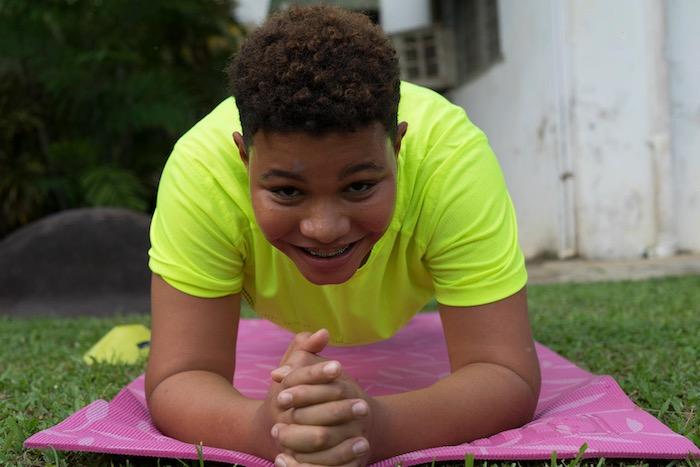
Elliot, 13, likes to exercise with his family at his home in Port of Spain, Trinidad. Breaking up time at home with workouts is a great way to stay healthy and relieve the stress of the coronavirus crisis. © UNICEF/UN0152676/Nesbitt
Though screen time probably makes everyone’s list of fun things to do — whether it’s going on TikTok, playing Roblox or checking Instagram — make sure you incorporate some movement into every day, too. Family yoga, walks and runs can relieve stress and help keep everyone healthy.
Focus on the positive
Many things feel out of control. But you and your family can find peace and a sense of accomplishment by meeting each day's challenges as a team. By working together, respecting one another's boundaries and appreciating what everyone — young and old — brings to the table, you will weather these tough times and come out stronger.
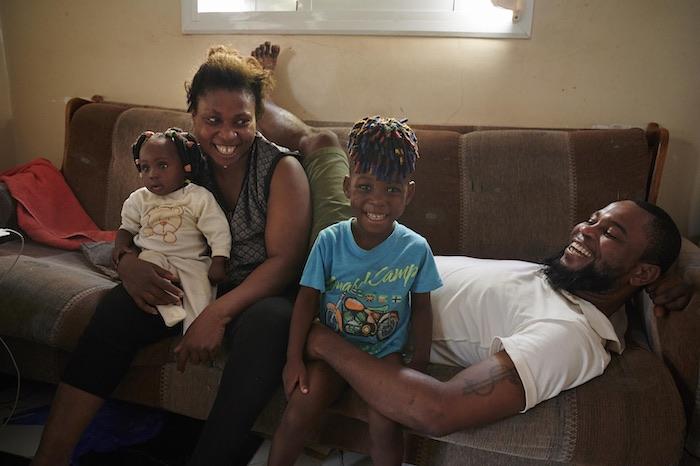
Since migrating from Nigeria to Morocco, Mustafa, holding his 3-year-old son, Arafat, and his wife, Rashida, with her niece, have made their living begging on the streets. But the bonds of family — here they are pictured in the home of Rashida's sister, who is on her own with four children — provide comfort during difficult times. © UNICEF/UNI238804/Noorani
Help UNICEF be there for vulnerable children around the world during the coronavirus global health emergency. Your support is urgently needed.
Top photo: Igor Sukhomlyn and his wife and three children live in Ukraine, where low vaccination rates caused a measles epidemic that has infected over 100,000 people, killing at least 41, 25 of them children. UNICEF responded by providing technical and communication support and helping to procure vaccines to protect kids from measles as well as mumps and rubella. © UNICEF/UN0301276/Zmey
